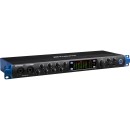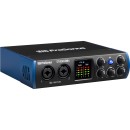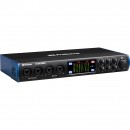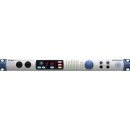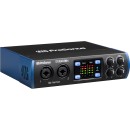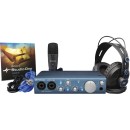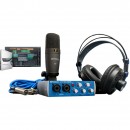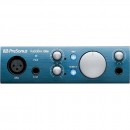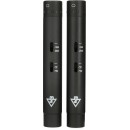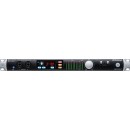- Musicians, Small Bands, Producers
- USB Type-C and USB Type-A Connectivity
- 4 Class-A Mic/Line Preamps (2 w/ Hi-Z)
- 1 Headphone Out, 4 DC-Coupled Line Outs
- 24-Bit / 192 kHz AD/DA
- External Power Supply / Mac, Windows
- Phantom Power, Direct Monitor
- MIDI and S/PDIF I/O via Breakout Cable
- 4-Segment I/O Metering
- DAWs, VIs, Plug-Ins, Loops, and Samples
Introduction
In this article, we delve into a detailed analysis of 43,754 user reviews from various languages worldwide to examine the Presonus Studio 68c. This analysis is performed by the RR artificial intelligence and updated daily with newly submitted reviews. The RR AI utilizes a complex algorithm to first scrutinize user reviews for credibility, filtering out unreliable ones. It then proceeds to dissect and evaluate the valuable insights within these reviews, providing users with ratings regarding the features of this product. Based on these assessments, users can make informed decisions about whether this product is suitable for them or not.
Ratings Based on Features
These results are a summary of user reviews of the Presonus Studio 68c. For example, 89% of 25,585 users who have commented on the Value for money of the Presonus Studio 68c have given positive feedback.
Highlighted Customer Reviews
Showing 1 to 4 of 4 Reviews
Some design issues, and the gain range isn't 80db

PreSonus Studio 68c Desktop 6x6 USB Type-C Audio/MIDI Interface
Reviewed by Matthew on B&H Photo Video
I usually love Presonus, as the quality always feels top-notch and support seems to be better than that offered by other brands. While the Studio 68c is a decent little interface, it has some minor issues where I would hesitate to recommend this product over some of the competitors in this price range. The Presonus Studio 68c is a decent value for the money, especially with its 4 XLR mic/line inputs, segmented I/O metering, latency-free monitoring, excellent drivers, and the overall look/form of the interface. The gain range or headroom also seems to be better than average in this price range, although there is a caveat on this that will be explained in greater detail below. With all of these pros comes some cons. Depending on your use-case, these cons might seem minor or they may very well be a deal breaker. The first design limitation is the phantom power. The 48v phantom power is connected to all mic inputs, so phantom power can either be turned on for all mic inputs or turned off. You cannot use a dynamic mic and condenser mic at the same time, for example, unless you use something like a DI box or mic activator, such as a Cloudlifter. With the Presonus Studio 68c, you very well may need a mic activator if you are trying to drive a gain-thirsty dynamic microphone like the Sure SM7b. Presonus claims that the gain range for the Studio 68c is 80db, however this doesn't seem to be the case. With the gain pot maxed out, I'm barely able to drive the Sure SM7b, which would suggest a gain range closer to 65db, maybe even 70db tops, at least with my individual unit. Additionally, the gain isn't so clean when its maxed out like that, so I'm forced to use an activator like the Cloudlifter to drive my Sure SM7b where I can dial the gain pot down to get a cleaner signal. I actually started to use a dbx 286s in front of the Studio 68c, but with this setup I could have just as well used a less expensive interface with smaller gain range. Another design flaw, and the biggest by far imo, is that the 1/4 TRS headphone output jack is on the back of the Studio 68c, which is inconvenient to say the least. Not only does it prevent clean cable routing, but it potentially introduces RF interference into my audio signals because I have to cross my other inputs and outputs with the unbalanced headphone cable to get my headphones around to the front where I can use them. The limitations of Presonus' Studio 68c such as the phantom power and overstated gain range (or stunted gain range) I can chalk up to cost-saving measures to lower the price of the interface. However, it seems like it would have been relatively easy to squeeze the headphone jack on the front of the interface somewhere. With all of that said, however, I do think this is a decent interface for the price. It's just that competitors have really stepped up their game with audio interfaces and so there are better choices in this price range. ... More
Great Interface

PreSonus Studio 68C 6x6 USB-C Audio / MIDI Interface
Reviewed by Henry H. on Reverb
I'm so glad to have chosen the PreSonus Studio 68c. It's modern USB-c technology, allowing multi-track recording over the same stream, and excellent preamps fulfill all my home studio needs. My instruments are recorded clearly and precisely. This model includes professional level electronics and is much better than the bus powered interface I used previously.
Absolutely Flawless!

PreSonus Studio 68c Desktop 6x6 USB Type-C Audio/MIDI Interface
Reviewed by Jeremy on B&H Photo Video
This is yet another excellent audio interface from PreSonus! With a sleek design and USB-C connectivity, this thing is a powerhouse for at home recording or streaming.
I love this product.

Presonus Studio 68c USB-C 6x6 Audio/MIDI Interface
Reviewed by Ted on Guitar Center
Home studio recording with 4+ inputs is great with no noise. Love it!
Ads








